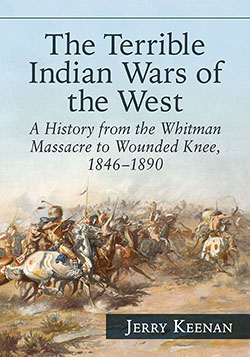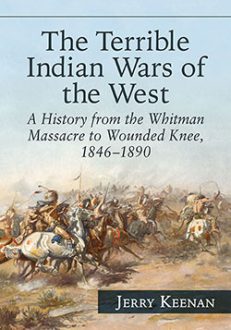The Terrible Indian Wars of the West
A History from the Whitman Massacre to Wounded Knee, 1846–1890
$49.95
In stock
About the Book
Expansion! The history of the United States might well be summed up in that single word. The Indian Wars of the American West were a continuation of the struggle that began with the arrival of the first Europeans, and escalated as they advanced across the Appalachians before American independence had been won.
This history of the Indian Wars of the Trans-Mississippi begins with the earliest clashes between Native Americans and Anglo-European settlers. The author provides a comprehensive narrative of the conflict in eight parts, covering eight geographical regions—the Pacific Northwest; California and Nevada; New Mexico, the Central Plains, the Southern Plains; Iowa, Minnesota and the Northern Plains; the Intermountain West, and the Desert Southwest—with an epilogue on Wounded Knee.
About the Author(s)
Bibliographic Details
Jerry Keenan
Format: softcover (7 x 10)
Pages: 504
Bibliographic Info: 34 photos, notes, bibliography, index
Copyright Date: 2016
pISBN: 978-0-7864-9940-3
eISBN: 978-1-4766-2310-8
Imprint: McFarland
Table of Contents
Table of Contents
Preface 1
Timeline 3
Introduction 7
I—The Pacific Northwest
Prologue: The Oregon Country 15
Death on the Rye Grass: The Whitman Massacre and the Cayuse War, 1847–1855 15
Isaac Stevens 20
“Nits make lice”: The Rogue River Wars, 1851–1857 20
The War of 1853 27
The War of 1855 31
The Yakima and Coastal Wars, 1856–1858 39
II—California and Nevada
Prologue: Bloody El Dorado 50
The Mariposa War, 1850–1851 51
The Mendocino War, 1859–1860 57
Nevada’s Paiute War, 1860 59
The Owens Valley War, 1862–1863 69
War with the Northern Paiutes: Indian Raids Along the Western Segment of the Overland Trail, 1864–1868 73
Chinese Massacre 75
Crook and the Paiutes 76
Hell with the Fires Gone Out: The Modoc War, 1872–1873 79
III—New Mexico
Prologue: Poco Tiempo 92
Navajo Wars 94
The Missouri Volunteers Arrive 94
The Ugliest Man in the Army 98
Sandoval 98
Colonel Edwin Vose Bull Sumner 100
Fort Defiance 100
Henry Dodge 102
Governor David Meriwether 104
Kit Caron Reports 105
Jornada del Muerto 107
Chandler-Eaton Expedition 110
Colonel Benjamin L.E. Bonneville 111
The Black Jim War 115
Colonel Edward R.S. Canby and Major Henry Hopkins Sibley 123
Manuel Chavez, Navajo Fighter 126
The Arrival of Colonel James Henry Carleton 128
Kit Carson’s Expedition to Canyon de Chelly 129
The Long Walk of the Navajo 130
IV—The Central Plains
Prologue: Pike’s Peak or Bust 132
The 1851 Horse Creek Treaty 133
Fort Laramie 133
1853 Overture 135
Grattan Massacre 136
“By God I’m for battle—no peace” 137
Blue Water Expedition 138
Bull Sumner Takes the Field 141
To Colorado 146
Governor John Evans 147
Colonel John Milton Chivington 148
The Hungate Massacre 151
The 3rd Colorado Volunteers 152
Sand Creek 154
The Tappan Commission Investigates 162
The War of 1865 165
Attack on Julesburg 166
Mud Springs and Rush Creek 168
The Connor Expedition 170
Colonel Thomas Moonlight 171
Colonel Nelson Cole, Lieutenant Colonel Samuel Walker and Colonel James H. Kidd 173
The Platte Bridge Fight 175
Connor Attacks Black Bear’s Village 178
The Odyssey of Cole and Sawyer 178
Hancock Takes the Field 183
The Kidder Tragedy 198
Custer Is Court-Martialed 199
Philip H. Sheridan 202
The Battle of Beecher Island 203
The Battle of Summit Springs 205
V—The Southern Plains
Prologue: Llano Estacado 207
Conflict on the Southern Plains 209
The Texas Rangers 209
Captain Randolph B. Marcy 211
The Comanche: Lords of the Southern Plains 213
John Robert Baylor 215
The Battle of the Washita 221
Enter the Quakers 227
The Warren Wagon Train Raid 228
Quanah Parker 230
The Red River (Buffalo) War 232
Adobe Walls 234
Colonel Nelson Appleton Miles 235
The Battle of Palo Duro Canyon 240
The Mexican Border Crisis 244
VI—Iowa, Minnesota and the Northern Plains
Prologue: Little Crow to Sitting Bull 248
Conflict on the Northern Plains: War with the Arickaras 248
Spirit Lake, Iowa, 1857 249
Bloodbath in the Heartland: Minnesota, Summer 1862 251
Sunday, August 17, 1862 251
The Santees 252
Little Crow 254
The Uprising Begins 255
First Attack on New Ulm 256
Attack on Fort Ridgely 259
Second Attack on New Ulm 260
The Battle of Birch Coulee 262
General John Pope Is Appointed Department Commander 264
Fort Abercrombie 265
The Battle of Wood Lake and the End of the Uprising 266
The Release of the Hostages 267
The Hanging of the Condemned Santees 267
The Death of Little Crow 268
The Dakota Campaigns of Sibley and Sully, Summer 1863–1864 269
The Battle of Big Mound 270
The Battle of Dead Buffalo Lake 271
The Battle of Whitestone Hill 274
The Minnesota Brigade 278
The Battle of Killdeer Mountain 280
The Teton Lakota: Lords of the Northern Plains 284
Gold and Fire: Red Cloud’s War, 1866–1868 285
The Bozeman Trail 285
Fort Phil Kearny: The Hated Post on the Piney 288
The Fetterman Disaster 290
The Amazing Ride of Portugee Phillips 292
The Hayfield and Wagon Box Fights, August 1867 294
The 1868 Laramie Treaty 298
Massacre on the Marias River, January 23, 1870 300
The Northern Pacific Railroad 300
Custer Meets the Sioux 302
Custer’s 1874 Black Hills Expedition 303
The Great Sioux War 310
Reynolds Attacks the Cheyenne on Powder River, March 17, 1876 310
The Battle of the Rosebud, June 17, 1876 314
The Little Bighorn: Custer’s Nadir, June 25, 1876 316
The “first scalp for Custer” 324
The Battle of Slim Buttes 326
Mackenzie’s Attack on Dull Knife’s Village 336
The Wolf Mountain Campaign 340
The End of the Great Sioux War 343
The Surrender and Death of Crazy Horse 346
The Flight of the Nez Perce 348
The Battle of White Bird Canyon 352
Joseph Surrenders 363
Flight of the Northern Cheyennes, 1878–1879 365
Sitting Bull Surrenders, 1881 370
VII—The Intermountain West
Prologue: The Ute Crisis 376
Mormon Troubles 377
Walkara’s War 378
Conflict in the Mountains 379
Connor Attacks Bear Hunter’s Village 380
Colorado Gold 381
The Blackhawk War 381
The Bannack Uprising, 1878 384
The Ute War and the Meeker Massacre, 1879 387
The Battle of Milk Creek, September 1879 391
The Sheepeater War, 1879 394
VIII—The Desert Southwest
Prologue: West of South and South of West 395
Outposts on the Colorado: Clashes with the Yumas and Mojaves, 1849–1858 396
Apacheria 399
The Apache versus the Spanish 400
The Apache versus Mexico 401
Mangas Coloradas 403
The Norte Americanos 405
John Russell Bartlett and the Mexican Boundary Survey 406
The Acoma Peace Agreement 407
The Butterfield Overland Mail Route 408
Michael Steck 409
War with the Americans: The Bascom Affair 411
Cochise Takes the Offensive 415
Colonel James Henry Carleton 417
The Battle of Apache Pass 418
The Death of Mangas Coloradas 420
The Rise of Cochise 422
The Camp Grant Massacre 427
Crook Arrives in Arizona 428
Thomas Jeffords 430
Howard Meets Cochise 431
Crook’s Grand Offensive 433
The Salt River Cave Fight 435
The Death of Cochise 436
John Clum 438
The Emergence of Victorio 439
The Rise of Geronimo 440
The Cibecue (Cibicue) Affair, August 1881 442
The Return of General Crook 447
Emmett Crawford and Charles Gatewood 447
The McComas Murders 448
Tom Horn 453
Crook Meets with Geronimo 455
Miles Replaces Crook 455
Miles Meets with Geronimo 457
Epilogue
Wounded Knee, South Dakota, December 1890 459
Notes 463
Recommended Reading 469
Index 473
Book Reviews & Awards
“recommend…. Civil War buffs will get a kick out of seeing the pre- and post-Civil War careers of some great Union and Confederate officers”—Civil War News; “the chronological timeline is very valuable and the book has a good index and a solid list of recommended readings. Full of interesting stories about individuals and events and the author’s candid commentary, the book is engaging and a useful reference source”—ARBA; “a comprehensive examination of the wars between European immigrants and indigenous peoples throughout the Western United States between 1846 and 1890”—ProtoView; “a comprehensive narrative…fill[s] a void by presenting a new inclusive study of the Western Indian Wars, one that enables readers to arrive at a fresh and more enlightened view of these terrible conflicts and emerge with a deeper understanding of how they developed and the lamentable consequences that resulted…tells what happened; what brought on the wars, and how they were prosecuted…Keenan has filled the need for an all-encompassing single volume history of the Western Indian wars…brings together the most recent works in the field, and from them distills a comprehensive, readable narrative, historically accurate, yet without the minutiae found in more detailed studies of individual campaigns and battles”—SirReadaLot.org.





